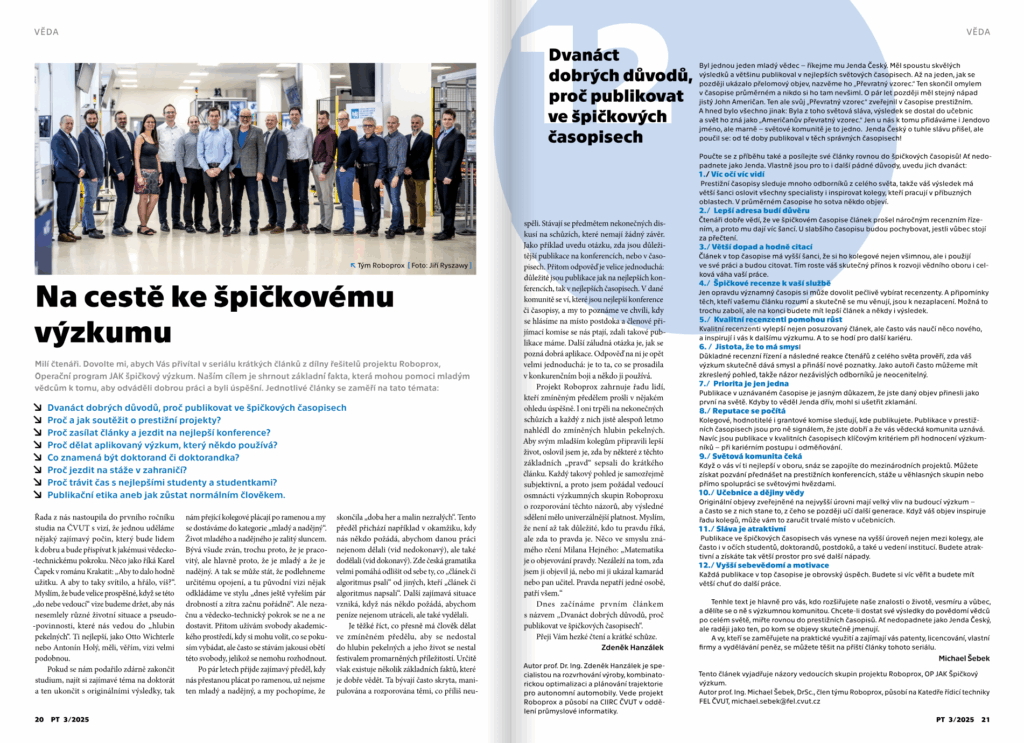Young Researcher’s Compass
Guiding Your Path to Excellent Research
A series of short articles by the ROBOPROX project team in collaboration with the editorial team of Pražská technika magazine. ROBOPROX research leaders initiated a series of practical insights and proven advice to guide early-career scientists on their path to success and excellent research.
The goal of this endeavour is to summarise the basic facts that can help young scientists do good work and be successful. The individual articles will focus on the following topics:
Introduction: On the path to cutting-edge research (by Zdeněk Hanzálek)
1. Twelve good reasons to publish in top journals. (by Michael Šebek)
2. Why and how to compete for prestigious projects? (by Jan Zeman)
3. Why attend high-quality scientific conferences and why publish there? (by Tomáš Svoboda)
4. How to conduct applied research that people actually use? (by Zdeněk Hanzálek and Tomáš Polcar)
5. What does it mean to be a doctoral student?
6. Why go on internships abroad?
7. Why spend time with the best students?
8. Publication ethics, or how to remain a normal person.
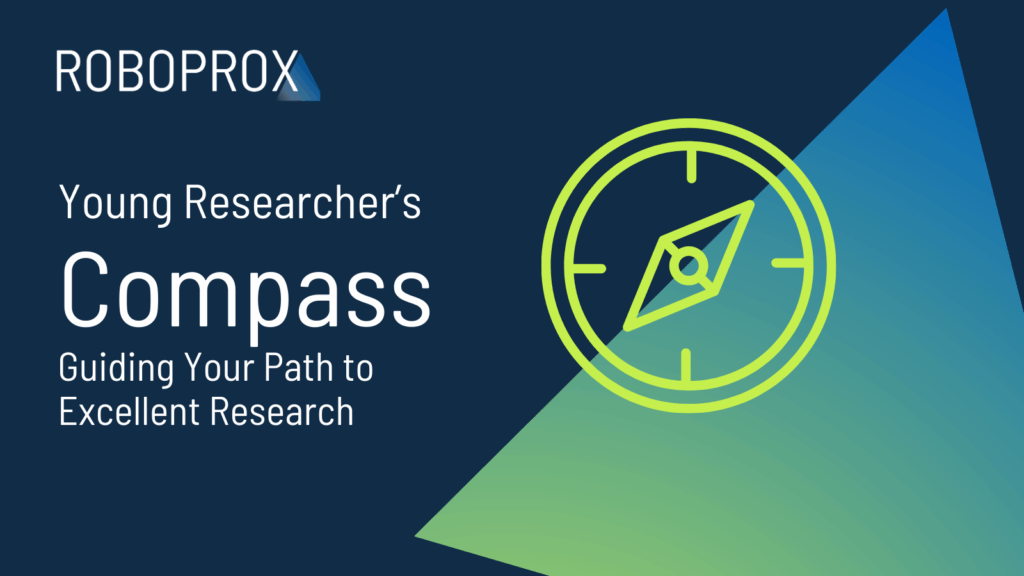

Hands-on guidelines will be published regularly in both electronic and printed form in the Czech Technical University magazine “Pražská technika”.
The authors of this series and the editors of Pražská technika welcome opinions on the topics of individual articles, as well as insights from both students, junior and experienced scientists. The discussion is open here on the Roboprox website, and we plan to publish readers’ responses in the university magazine.
Introduction: On the path to cutting-edge research (by Zdeněk Hanzálek)
Published in Pražská Technika 03/2025 (12 June 2025)
Dear readers, allow me to welcome you to a series of short articles written by the Roboprox project team, Operational Program JAK Top Research. Our goal is to summarize the basic facts that can help young scientists do good work and be successful. Individual articles will focus on the above topics.
Many of us started our first year of study at CTU with the vision that one day we would do something interesting that would benefit people and contribute to scientific and technological progress. Something like what Karel Čapek says in his novel Krakatit: “So that it would be very useful. And so that it would also shine and give off heat, you know?” I think it will be very beneficial if we stick to this “sky-high” vision so that we are not crushed by various life situations and pseudo-obligations that lead us into the “depths of hell.” The best, such as Otto Wichterle and Antonín Holý, had, I believe, a very similar vision.
If we manage to successfully complete our studies, find an interesting topic for our doctorate, and finish it with original results, our well-wishing colleagues pat us on the back and we are placed in the “young and promising” category. The life of the young and promising is bathed in sunshine. They are invited everywhere, partly because they are hard-working, but mainly because they are young and promising. And so it may happen that we succumb to a certain intoxication and somehow postpone our original vision in the style of “I’ll just sort out a few minor details today and start properly tomorrow.” But I don’t start, and scientific and technological progress fails to materialize. At the same time, I enjoy the freedom of the academic environment, where I can choose what to research, but I often become a victim of this freedom because I can’t make up my mind.
After a few years, an interesting turning point comes when people stop patting us on the back, we are no longer young and promising, and we understand that the “time of games and unripe raspberries” is over. This turning point comes, for example, when someone asks us not only to do a given job (imperfective aspect), but also to finish it (perfective aspect). Here, Czech grammar is very helpful in distinguishing between those who “were writing an article or algorithm” and others who “wrote an article or algorithm.” Another interesting situation arises when someone asks us to not only spend money, but also earn it.
It is difficult to say exactly what a person should do at this turning point to avoid falling into the depths of hell and turning their life into a festival of wasted opportunities. However, there are certainly a few basic facts that are good to know. These are often hidden, manipulated, and disputed by those who have not been very successful. They become the subject of endless discussions at meetings that lead nowhere. As an example, I will mention the question of whether publications at conferences or in journals are more important. The answer is very simple: publications at the best conferences and in the best journals are important. The community knows which conferences and journals are the best, and we find this out when we apply for a postdoc position and the members of the admissions committee ask us if we have such publications. Another tricky question is how to recognize a good application. Again, the answer is very simple: it is one that has prevailed in competition and is being used by someone.
The Roboprox project involves a number of people who have successfully navigated this transition in some way. They too suffered through endless meetings, and each of them surely caught at least a glimpse of the aforementioned depths of hell. In order to prepare a better life for their younger colleagues, I asked them if they would write a short article about some of these basic “truths.” Each such view is, of course, subjective, so I asked the leaders of Roboprox’s eighteen research groups to debate these opinions so that the resulting message would have more universal validity. I think it is not so important who tells the truth, but whether it is the truth. Something along the lines of Milan Hejný’s famous saying: “Mathematics is about discovering the truth. It doesn’t matter whether I discovered it myself or whether a friend or teacher showed it to me. The truth does not belong to one person; it belongs to everyone.”
Today we begin with the first article entitled “Twelve good reasons to publish in top journals.” I wish you pleasant reading and short meetings. Zdeněk Hanzálek
Author Prof. Dr. Ing. Zdeněk Hanzálek is a specialist in production scheduling, combinatorial optimization, and trajectory planning for autonomous vehicles. He leads the Roboprox project and works at CIIRC CTU in the Department of Industrial Informatics.
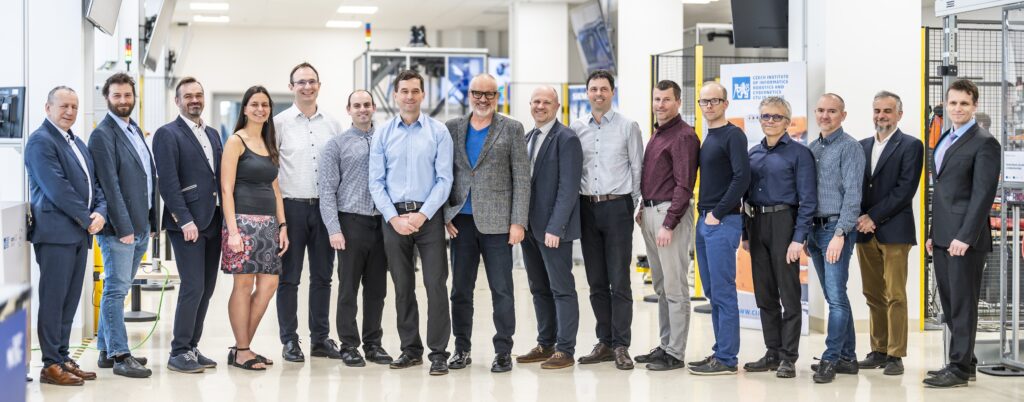
#1 Twelve good reasons to publish in top journals (by MichaEl Šebek)
Published in Pražská Technika 03/2025 (12 June 2025)
Once upon a time, there was a young scientist – let’s call him Jenda Český. He had many great achievements and published most of them in the world’s best journals. Except for one, which later turned out to be a groundbreaking discovery, let’s call it the “Revolutionary Formula”. It ended up by mistake in a mediocre journal, and no one noticed it there. A few years later, a certain John American had the same idea. However, he published his “Revolutionary Formula” in a prestigious journal.
And suddenly everything was different: it brought him worldwide fame, the result made it into textbooks, and the world knows it as “American’s Revolutionary Formula”. Only in our country do we add Jenda’s name to it, but in vain – the global community doesn’t care. Jenda Český lost this fame, but he learned his lesson: since then, he has published in the right magazines!
Learn from this story and send your articles straight to top magazines! Don’t end up like Jenda. In fact, there are other compelling reasons for this, and I will list twelve of them:
1. More eyes see more: Prestigious journals are read by many experts from around the world, so your results have a better chance of reaching all specialists and inspiring colleagues working in related fields. In an average journal, hardly anyone will discover them.
2. A better address inspires confidence: Readers are well aware that articles in top journals have undergone a rigorous review process, so they are more likely to give them a chance. With weaker journals, they will doubt whether they are even worth reading.
3. Greater impact and many citations: An article in a top journal has a better chance of not only being noticed by colleagues, but also being used in their work and cited. This increases your actual contribution to the development of the scientific field and the overall weight of your work.
4. Top-notch reviews at your service: Only a truly significant journal can afford to carefully select reviewers. And the comments of those who understand your article and really devote themselves to it are priceless. It may hurt a little, but in the end you will have a better article and sometimes even a better result.
5. Quality reviewers will help you grow: Quality reviewers will not only improve the article under review, but will often teach you something new and inspire you to further research. And that’s good for your future career.
6. Certainty that it makes sense: A thorough review process and subsequent feedback from readers around the world will verify whether your research really makes sense and brings new insights. As authors, we can often have a biased view, so the opinion of independent experts is invaluable.
7. There is only one priority: Publication in a reputable journal is clear proof that you were the first in the world to make the discovery. If Jenda had known this earlier, he could have saved himself the disappointment.
8. Reputation counts: Colleagues, reviewers, and grant committees keep track of where you publish. Publications in prestigious journals are a signal to them that you are good and that you are recognized by the scientific community. In addition, publications in high-quality journals are a key criterion in the evaluation of researchers—both in terms of career advancement and remuneration.
9. The global community is waiting: When the best in the field know about you, it is easier to get involved in international projects. You may receive invitations to lecture at prestigious conferences, internships with renowned groups, or direct collaboration with global stars.
10. Textbooks and the history of science: Original discoveries published at the highest level have a major impact on future research – and often become the basis for what future generations learn. If your discovery inspires a number of colleagues, it can guarantee you a permanent place in textbooks.
11. Fame is attractive: Publications in top journals will elevate you to a higher level not only among your colleagues, but often also in the eyes of students, doctoral students, postdocs, and institutional leaders. You will become attractive and gain more space for your future ideas.
12. Higher self-confidence and motivation: Every publication in a top journal is a huge success. You will have more confidence and be more eager to continue your work.
This text is mainly for those of you who are expanding our knowledge of life, the universe, and everything, and sharing it with the research community. If you want to bring your results to the attention of scientists around the world, aim straight for prestigious journals. Don’t end up like Jenda Český, but rather like the person after whom discoveries are actually named.
And those of you who focus on practical applications and are interested in patents, licensing, owning companies, and making money can look forward to the next articles in this series.
Author Prof. Ing. Michael Šebek, DrSc., member of the Roboprox team, works at the Department of Control Engineering, FEE CTU – Faculty of Electrical Engineering, Czech Technical University in Prague, michael.sebek@fel.cvut.cz.
#2 Why and how to compete for prestigious projects? (by Jan Zeman)
Published in Pražská Technika 04/2025 (September 2025)
Let us be honest: preparing grant applications for highly competitive schemes, such as the Marie Skłodowska-Curie Fellowships, European Research Council (ERC) Grants, or their national versions, is demanding and time-consuming. The competition is fierce, and success can feel almost out of reach. Some colleagues may even suggest that instead of chasing your own prestigious grant, you should focus on “real work,” like teaching, consultancy for industry, or working on their projects.
And yet, there are at least five strong reasons why you should go for it.
1. You are not alone. Begin by reaching out to colleagues who have already experienced the process. You might be surprised by how approachable they are, even those in senior positions or outside your immediate research circle. Many will gladly share their experiences, highlight common pitfalls (such as not paying attention to all the evaluation criteria because there is no second “review” round), and even share their successful and unsuccessful applications with you. After all, they, too, almost certainly received comparable support at key moments in their careers.
At the same time, you can rely on CTU’s support. Since 2022, the Faculty of Civil Engineering has piloted a support program that has helped young researchers develop five projects recommended for funding (being among the top 10-15%) in competitive international calls. This proven model is now being expanded across the entire university. Additionally, ERC applicants can count on a nationwide team of specialists providing focused, interdisciplinary guidance. Also thanks to their help, Charles University, for example, achieved twice the European average success rate for 2024 ERC proposals. All these resources stand ready to guide you through the demanding process of proposal preparation. You just need to take the initiative and make the most of them.
2. Even failure counts. Most grant applications do not succeed on the first try, but that does not mean the effort is wasted. Writing a proposal sharpens your skills in planning, communication, and presenting new research ideas, abilities that will serve you well in any career. It also forces you to think about your medium- and long-term goals and begin shaping your own research agenda, something daily routines rarely allow. And if time is short, it is perfectly fine to ask colleagues for temporary help with teaching or administrative tasks so you can focus fully on your proposal.
Even if you do not secure funding in the end, reviewers usually provide valuable feedback. Their comments give you a chance to rethink, revise, and strengthen your ideas, perhaps in a completely different funding call. Every submission teaches important lessons and highlights areas for personal growth.
3. Learn from the best. Competing for prestigious grants is more than just securing funding; it is an opportunity to compare yourself to ambitious peers beyond the “little Czech pond.” The experience may often feel uncomfortable, but it is highly instructive and can change how you view your work and achievements so far.
Your chances of success improve when your CV presents a clear story of professional growth rather than simply listing positions and publications. By benchmarking against top researchers, you learn how to highlight your strengths in a way that stands out internationally. The same applies to your proposal: it is read by leading experts and compared to the strongest projects in the field, giving you rare insights into what makes your ideas competitive. Lessons like these are hard to find elsewhere, and they will support you throughout your career.
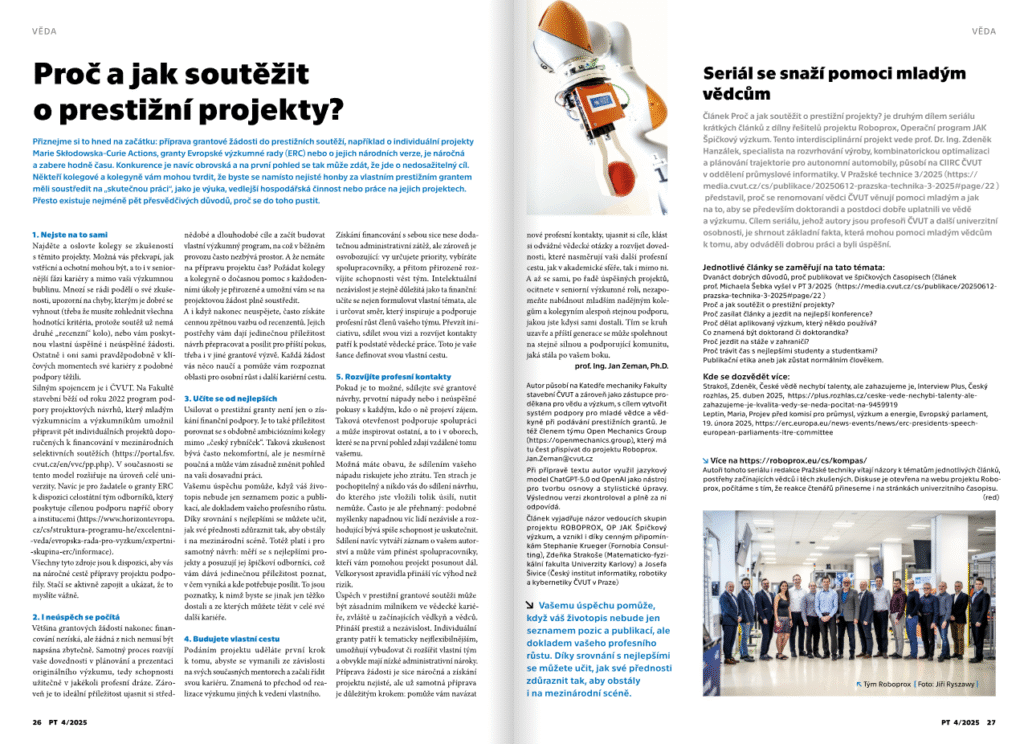
4. Shape your path. Every proposal you submit moves you toward more independence, shifting from implementing your mentors’ ideas to developing your own research focus. Writing and leading a project teach you to set priorities, build collaboration networks, and assemble a team around your vision.
Of course, obtaining funding involves extra paperwork, but it also provides freedom: the freedom to select your topics, explore exciting ideas, and mentor others in their professional growth. In many ways, developing intellectual independence is just as important as gaining financial independence. This is your opportunity to define your own path.
5. Share to grow. If possible, share your project ideas, whether they are early sketches, polished proposals, or even unsuccessful attempts, with colleagues who might be interested. This kind of openness often sparks collaboration and can inspire others, even in fields that seem far from your own. It is natural to worry that someone might “steal” your idea, but this fear is often exaggerated. In reality, many researchers develop similar ideas independently, and what really matters is the ability to execute them. By sharing, you not only create a clear record of your authorship but also increase the likelihood of finding partners who can help bring your vision to life. In the long run, generosity usually pays off more than it risks.
Achieving success in a prestigious grant competition can be a turning point in a researcher’s career, especially in its early stages. Beyond the recognition it provides, it also grants the freedom to select your own research path and to develop or grow a team around your ideas. Individual grants tend to be less burdened by administration, giving you more space to focus on the science itself. And even if the process is demanding and securing funding is uncertain, every application is a valuable learning experience: it encourages you to ask bold questions, refine your goals, connect with peers and collaborators, and develop skills that will serve you well, whether you stay in academia or venture beyond.
And when you take on a senior role, having successfully completed several projects on your own, make sure to be the kind of colleague you once needed. Share your time, open doors, and offer encouragement to those coming up behind you. By doing so, you complete the cycle: passing on the support that helped you and ensuring the next generation can benefit from the same strong and generous community.
Jan Zeman is a professor at the Department of Mechanics, Faculty of Civil Engineering, Czech Technical University in Prague, where he also serves as Deputy Vice Dean for Science and Research, responsible for developing support services for early-career researchers applying for prestigious grants. He is a proud member of the Open Mechanics Group, which is grateful for the opportunity to contribute to the Roboprox project.
Jan Zeman used OpenAI’s GPT-5 language model to draft the outline and polish the style of this text. He carefully reviewed the final version and takes full responsibility for its content.
The article reflects the views of the leaders of the ROBOPROX, OP JAC Excellent Research call, and incorporates valuable feedback from Stephanie Krueger, Zdeněk Strakoš, Josef Šivic, Milan Jirásek, and Martin Doškář.
Where to learn more:
- Maria Leptin, ERC President’s speech to the European Parliament’s ITRE Committee, European Parliament, 19 February 2025
- Zdeněk Strakoš, Czech science does not lack talent, but we are wasting it, Interview Plus, Czech Radio, 25 April 2025 (in Czech)
#3 Why Attend High-Quality Scientific Conferences and Why Publish There? (by Tomáš Svoboda)
Published in Pražská Technika 05/06/2025 (November 2025)
Scientific work is often perceived as a quiet, focused activity spent among papers, data, algorithms, and experiments. Yet to advance knowledge, we must know what is happening at the frontier of our field and take part in the ongoing expert dialogue. That is precisely the purpose of top-tier international conferences. Attending them means not only keeping up with the latest results, but also being part of the global conversation about where the field should head – and why.
A Concentration of Inspiration and People
At a high-quality conference, you encounter the very best of what is happening in your field within a few short days. It’s not just about the presentations (whether talks, posters, or demos) but also the overall atmosphere of openness and sharing. Pioneers from academia stand alongside researchers from companies that shape the world: at AI conferences, for example, Google DeepMind, Microsoft Research, OpenAI, Boston Dynamics, Mobileye, Waymo, Zoox, Nvidia, or Meta AI.
Both formal presentations and informal discussions reveal what already works, what is within reach, and which topics are emerging. Some contributions will impress you with their elegance; others will make you wonder why you didn’t think of something similar yourself. And even if it may sound surprising, this intense exposure to quality is often more valuable than the publication itself.
A Dialogue, Not a Monologue
Conferences are not only about “presenting something.” They are, above all, about conversations. Science is a social activity. In poster sessions, at lunch, in workshops, or in a hotel lobby, you meet people working on similar problems, often from different angles, with different datasets, or in a different context. These informal exchanges are irreplaceable and often provide feedback far more useful than formal journal reviews.
The reverse is also true. Asking a thoughtful question at the end of a talk or during a poster discussion is an excellent way to make a meaningful connection. Very few presenters fail to appreciate an inquisitive question. At the conference reception or dinner, continuing the conversation becomes easier, even for introverts.
In-person contact builds trust, and the connections you make at conferences often become invaluable later – for research collaborations, planning a postdoc or sabbatical, preparing an international grant consortium, or even for job opportunities. A simple LinkedIn connection then just confirms the relationship. The scientific world is surprisingly small, and personal ties matter.
A Clear Overview Without Hours of Googling and AI-Assistant Debates
Another enormous advantage is gaining an overview of the current state of the field. Top-tier conferences curate their contributions carefully. Competition is fierce, and quality matters not only for reputation but also for attracting top participants. For you, this means that within a few days you gain a comprehensive view of the field’s latest developments, without having to filter through hundreds of arXiv papers.
How to Choose a Conference
Selecting conferences carefully is essential. The landscape of scientific publishing (both journals and conferences) is flooded with average or substandard work. Some events (and journals) operate more as commercial businesses, focused on collecting author and participant fees rather than sharing high-quality science. They often use trustworthy-sounding names or acronyms.
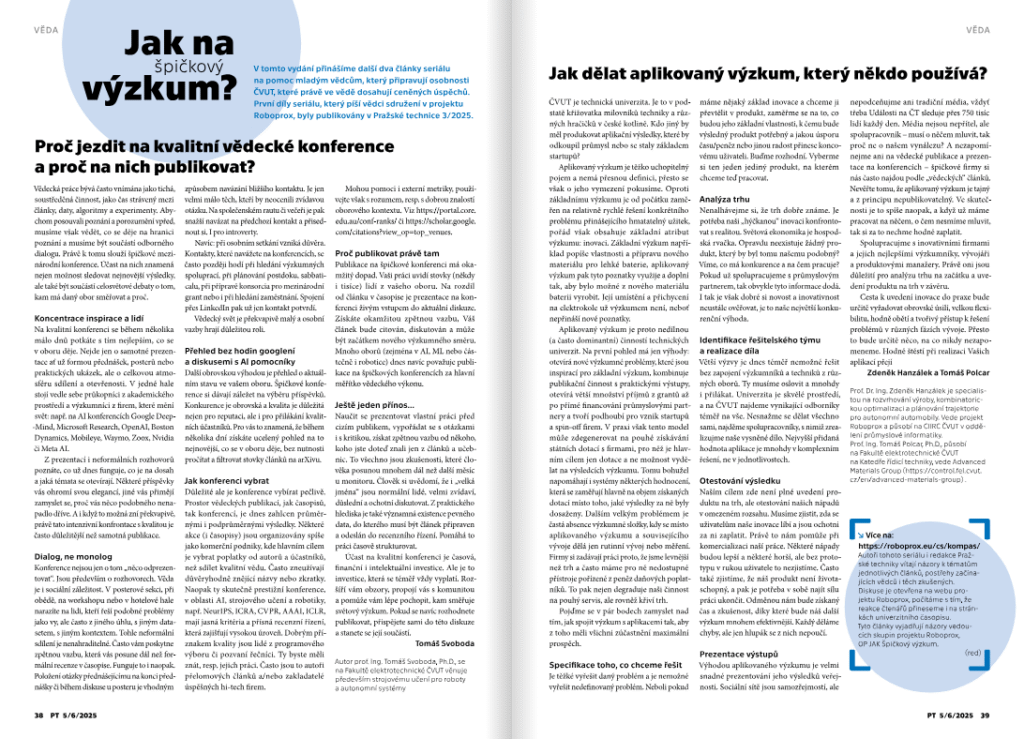
In contrast, truly prestigious conferences in AI, machine learning, and robotics (such as NeurIPS, ICRA, CVPR, AAAI, or ICLR) have clear standards and rigorous peer-review processes that ensure high quality. A good sign is the program committee and invited speakers – you should recognize their work. They are often authors of breakthrough papers or founders of successful high-tech companies. External metrics can help, but use them with caution and with awareness of the field context (e.g., CORE rankings or Google Scholar venue metrics).
Why Publish There
A publication at a top-tier conference has an immediate impact. Hundreds or even thousands of researchers in your field will see your work. Unlike a paper in a closed-access journal, a conference presentation is a live entry into the current debate. You gain immediate feedback; your paper will be cited and discussed, and it may spark an entirely new research direction. In many fields (especially AI, ML, or robotics) publications at top conferences are considered the primary measure of scientific excellence.
One More Benefit…
Learning to present your work in front of an unfamiliar audience, respond to questions and criticism, and receive feedback from someone you previously knew only from papers or textbooks – these are experiences that push you forward far more than another month behind a monitor. You also realize that even the “big names” are normal people, curious, rigorous, and happy to discuss. From a practical perspective, the fixed deadline for submitting a conference paper helps structure your work.
Attending a high-quality conference is a time, financial, and intellectual investment, but one that almost always pays off. It broadens your horizons, connects you with the community, and helps you understand the direction of global research. And if you decide to publish, you contribute to that discussion and become part of it.
#4 How to Conduct Applied Research That People Actually Use? (by Zdeněk Hanzálek and Tomáš Polcar)
Published in Pražská Technika 05/06/2025 (November 2025)
CTU is a technical university, a meeting ground for technology enthusiasts and tinkerers. Who else should be creating applied results that industry can adopt or that might form the basis of startups?
A Concentration of Inspiration and People
Applied research is a difficult concept to grasp and lacks a precise definition, yet we can still attempt to outline it. Compared with basic research, it focuses from the outset on solving a specific, practical problem that brings tangible benefit — while still retaining the essential attribute of research: innovation. Basic research may, for example, describe the properties and preparation of a new lightweight battery material; applied research then uses and extends this knowledge to make it possible to manufacture a battery from that material. Its placement on an e-bike is no longer research, as it brings no new knowledge. Applied research is therefore an integral — and often dominant — activity of technical universities. At first glance, it seems all positive: it opens new research problems that inspire basic research, combines publication with practical outputs, offers a wide range of funding opportunities (from grants to direct industrial contracts), and forms fertile ground for startups and spin-offs.
In practice, however, this model can degenerate into merely obtaining government subsidies with companies whose main interest is the subsidy itself, not the potential to profit from research results. Unfortunately, some evaluation systems encourage this by focusing primarily on the volume of funding obtained rather than on the outcomes achieved. Another major issue is the frequent absence of a true research component, where instead of applied research and development, only routine development or measurement is performed. Companies outsource work because we are cheaper than the market and possess expensive equipment financed by taxpayers. This degrades our work into mere service provision and distorts the market. Let us reflect on how to connect research with applications in a way that maximizes benefits for all parties.
Define What You Want to Solve
It is hard to solve a problem — and impossible to solve an undefined one. If we have the seed of an innovation and want to turn it into a product, we must specify the product’s basic features, its purpose, and the value it delivers — time saved, money saved, or some form of user benefit. We must be decisive: choose the one product we aim to develop now.
Market Analysis
Let us not kid ourselves that we know the market well. Our cherished innovation must be confronted with reality. The global economy is a bar fight. Is there really no product similar to ours? Do we know what competitors have or are working on? If we already collaborate with an industrial partner, they often provide much of this information — but verifying novelty and innovativeness is essential. It is our greatest competitive advantage.
Identify the Team and Carry Out the Work
Larger challenges today are nearly impossible to solve without experts and technicians from multiple fields. We must approach — and often attract — them. CTU offers an excellent environment, with outstanding specialists in nearly every domain. We should not try to do everything ourselves; instead, we should find collaborators with whom we can make our vision a reality. Often, the greatest added value lies in the integrated solution, not in individual components.

Testing the Outcome
Our goal is not full product launch but testing our ideas on a limited scale. We need to know whether users like our innovation and whether they would be willing to pay for it. This information is essential for commercialization. Some ideas will be better than others, and without a prototype in the hands of real users, we cannot know which is which. Sometimes we discover that our product is not viable — and must find the strength to stop the work. The reward is time saved and experience gained, making our next research effort far more effective. Everyone makes mistakes, but only a fool fails to learn from them.
Presenting the Results
One major advantage of applied research is how easy it is to present its results to the public. Social networks are obvious, but traditional media should not be underestimated — for example, Czech Television’s Události is watched by more than 750,000 people every day. Media are not the enemy but a partner — they need stories, so why not tell them about our invention? And don’t forget scientific publications and conference presentations — top companies often find us based on our “scientific work.” Don’t believe the myth that applied research is secret by definition and cannot be published. The opposite is usually true — and if we really must work on something we cannot talk about, we should be well compensated for it.
Collaborate with innovative companies and their best researchers, developers, and product managers. They are essential both for early market analysis and for final product launch. Bringing innovation into practice requires enormous effort, flexibility, sacrifice, and creative problem-solving along the way. Yet it will undoubtedly be something you never forget. We wish you the best of luck with your applications!
Open Discussion – Share your thoughts with us
The authors of this series and the editors of Pražská technika welcome opinions on the topics of individual articles, as well as insights from both students, junior and experienced scientists. The discussion is open here, and we plan to publish readers’ responses in the university magazine.
If you’d like to share feedback on multiple topics or articles, please submit a separate entry for each one using the same form. We will forward your feedback to the respective author(s) of the selected article as well as to the editors of Pražská technika.


